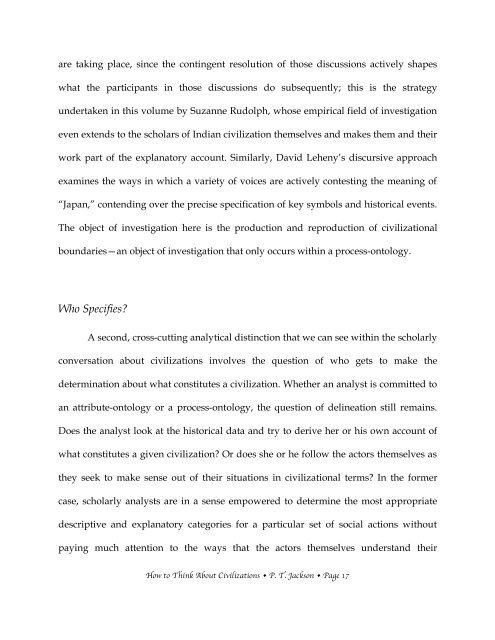How to Think About Civilizations - The Watson Institute for ...
How to Think About Civilizations - The Watson Institute for ...
How to Think About Civilizations - The Watson Institute for ...
Create successful ePaper yourself
Turn your PDF publications into a flip-book with our unique Google optimized e-Paper software.
are taking place, since the contingent resolution of those discussions actively shapes<br />
what the participants in those discussions do subsequently; this is the strategy<br />
undertaken in this volume by Suzanne Rudolph, whose empirical field of investigation<br />
even extends <strong>to</strong> the scholars of Indian civilization themselves and makes them and their<br />
work part of the explana<strong>to</strong>ry account. Similarly, David Leheny’s discursive approach<br />
examines the ways in which a variety of voices are actively contesting the meaning of<br />
“Japan,” contending over the precise specification of key symbols and his<strong>to</strong>rical events.<br />
<strong>The</strong> object of investigation here is the production and reproduction of civilizational<br />
boundaries—an object of investigation that only occurs within a process-on<strong>to</strong>logy.<br />
Who Specifies?<br />
A second, cross-cutting analytical distinction that we can see within the scholarly<br />
conversation about civilizations involves the question of who gets <strong>to</strong> make the<br />
determination about what constitutes a civilization. Whether an analyst is committed <strong>to</strong><br />
an attribute-on<strong>to</strong>logy or a process-on<strong>to</strong>logy, the question of delineation still remains.<br />
Does the analyst look at the his<strong>to</strong>rical data and try <strong>to</strong> derive her or his own account of<br />
what constitutes a given civilization? Or does she or he follow the ac<strong>to</strong>rs themselves as<br />
they seek <strong>to</strong> make sense out of their situations in civilizational terms? In the <strong>for</strong>mer<br />
case, scholarly analysts are in a sense empowered <strong>to</strong> determine the most appropriate<br />
descriptive and explana<strong>to</strong>ry categories <strong>for</strong> a particular set of social actions without<br />
paying much attention <strong>to</strong> the ways that the ac<strong>to</strong>rs themselves understand their<br />
<strong>How</strong> <strong>to</strong> <strong>Think</strong> <strong>About</strong> <strong>Civilizations</strong> • P. T. Jackson • Page 17
















